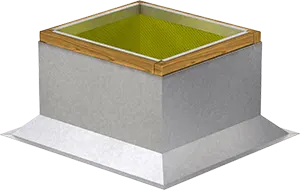Roof Curbs

Commercial Roof Curbs
Northeast Industrial Roof commonly receive calls from commercial building owners who made the mistake of hiring a non-roofing contractor to install or replace after-market roof curbs, which ended up being ill-fitted, substandard quality or simply poorly sealed, allowing air and/or water to enter the penetrations and causing airflow and moisture-related problems.
To guarantee your commercial roof remains safe and functional for the life of the roof system, your best option is to call a commercial roofer who can install fully-welded and assembled custom roof curbs that are properly fitted to your building’s roof-mounted components.
The roofers at Northeast Industrial Roof are specially trained, highly experienced and duly licensed to perform any roofing task for your commercial building. To learn more about how Northeast Industrial Roof can provide safety and functionality for your commercial building with quality roof curb installation, contact us today by calling: (781) 874-0248.
What Are Roof Curbs?
Though this might come with a little bit more up-front cost, you’ll increase the longevity of your roof system as well as provide the protection of proper attachment of your rooftop equipment. Over the life of the roof system, you will actually find that the slightly higher upfront cost of a job done right results in overall cost savings.

Types of Roof Curbs
Roof curbs are available in dozens of styles for just about any type of roof. Some of the most commonly-used curb styles are as follows:
Factory
The most common type of roof curb used in new construction for HVAC units mounted on flat roofs, the factory roof curb comes fully assembled, welded and coated. Included is the optional gasket material for airtight RTU installation.
Horizontal
Designed for use on flat roofs, this curb ships fully assembled, insulated and gasketed for quick installation. The curb is constructed with galvanized steel and a full-perimeter wood nailer strip, and is appropriate for use in applications requiring airtight installation.
Metal
Designed for metal roofs (ribbed or standing seam), metal roof curbs are custom-fabricated to fit skylights, roof vents, hatches and more. These curbs are cost-effective, watertight and galvanized to resist corrosion and can be customized with optional features such as a rain diverter, added reinforcement or additional height.
Platform
This curb type provides a base to support mechanical equipment that is to be directly mounted onto the curb. The galvanized metal cover houses a plywood panel and welded steel channels for added reinforcement and the optional pipe sleeve eliminates the need for additional penetrations. The platform can be roofed in or fastened to a concrete slab.
Structural
This curb style is constructed from heavy-gauge galvanized steel with internal dividers for additional support. These curbs can be insulated or non-insulated, with the insulated style used primarily for smaller equipment, such as exhaust fans, and the non-insulated version designed mainly for use with larger HVAC units.
Adjustable Pitch
This type of curb is designed to pitch in any direction, up to one in twelve inches in either direction. Many roofers prefer adjustable pitch curbs due to the flexibility that allows them to stock and store fewer styles of roof curbs as well as the lower retail price per curb than fixed-pitch curbs. Plus, they ship knockdown (unassembled), so storing and transporting them doesn’t take up as much space as fixed curbs.
Vibration Isolation Curb
This curb, designed specifically for roof-mounted fans, consists of a standard curb as a base and an adjustable spring unit on top. The assembly is of galvanized steel construction with Neoprene gaskets and seals for maximum sound deflection.
How to Choose the Right Roof Curbs for Your Commercial Roof
While there are many choices available in terms of roof curbs for commercial roofs, you most likely won’t have to worry about choosing the correct one, as your roofers will use their expertise to analyze your roof’s needs and ensure that the proper roof curb is installed.
- Roof slope
- Type of roofing material
- Roof profile
- Weight of rooftop equipment
- Warranty requirements of roofing system
- Local building code requirements
- Regional climate conditions
- Sub-framing
These considerations are of vital importance, as they tell your roofer which type of roof curb will be both utilitarian and safe for decades to come.
It’s important to keep in mind that installation of roof curbs is not a job for roofers alone; in fact, some applications require more than one trade to complete, with some needing three or more different subcontractors. For example, mechanical applications such as those involving exhaust fans, HVAC units or other electrical components require an electrician; similarly, applications that include skylights, hatches or other architectural features require an architect to be on hand.
No matter how large or small your commercial building’s roof is, structural reinforcements are important to make sure your building’s rooftop fans, HVAC units and other roof-mounted components are securely attached using roof curbs to ensure the safest possible building.
